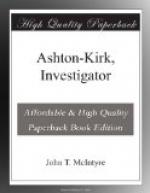David P.
Hume
numismatist
philatelist
art curiosities
A policeman stood at the head of the stairs smoking a cigar in an informal way.
“All right,” said he, “if Osborne let you come up I’ve got nothing to say. He’s the boss.”
“Have you looked over the place?”
“Just a glance. The floor has been fitted up as an apartment. Hume occupied all the rooms. The body,” pointing to the front room, “is in there.”
“Thanks.”
Ashton-Kirk turned the knob of the door nearest, the one with the lettering upon it. The room was without windows; the investigator closed the door and lighted the gas.
“Just a moment,” said he.
The door leading to the front room stood wide. He disappeared through this for a moment; when he returned, his face wore a tightened expression; his eyes were swift and eager.
“This is a sort of store room, I should say,” spoke Pendleton.
Pictures hung about upon the walls and stood packed in corners; statues of bronze, marble and plaster were on every side; brass bas-reliefs, rugs of Eastern design and great price, antique armor, coin cabinets, ponderous stamp albums, Japanese paintings and carvings and a host of queer and valuable objects fairly crammed every inch of space.
“I had heard that Hume was wealthy,” commented Ashton-Kirk. “And this seems to prove it. This room contains value enough to satisfy a fairly reasonable person.”
The two young men passed through into what appeared to be a kitchen. There was an ill kept range upon one side cluttered with cooking things. A bare oaken table of the Jacobean period held the remains of a meal. A massive Dutch side-board, covered with beautiful carving, stood facing them; every inch of available space upon it was crowded with bottles, decanters and glasses.
“The gentleman was not averse to an occasional nip, at any rate,” said Pendleton. “And his taste was rather educated, too,” examining the sideboard’s contents carefully. “The best was none too good for him.”
Beyond this again was a bedroom. The bed was a huge Flemish affair, and also elaborately carved; over it was a spreading Genoese canopy, which through lack of care had grown dusty and tattered. Rich old rugs were spread upon the neglected floor; a beautiful Louis Quinze table had its top covered with discolored rings made by the bottoms of glasses, and the lighted ends of cigars had burned spots on it.
“The bed of a prince and the floor coverings of a duke,” said Pendleton with indignation. “And used much as a coal heaver would use them. Now, this table is really a scandal. If its owner has been murdered, I don’t wonder at it. Some outraged lover of such things has probably taken the law into his own hands.”
But Ashton-Kirk was paying little attention to the things that appalled Pendleton.




